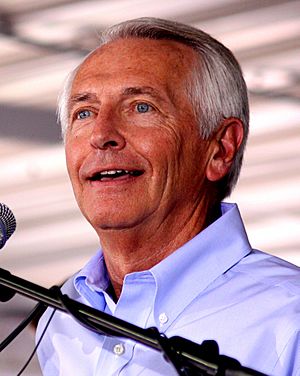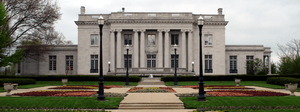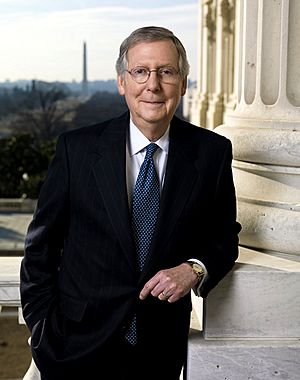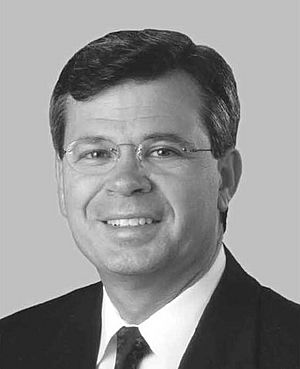Steve Beshear facts for kids
Quick facts for kids
Steve Beshear
|
|
|---|---|

Beshear at Fancy Farm, 2010
|
|
| 61st Governor of Kentucky | |
| In office December 11, 2007 – December 8, 2015 |
|
| Lieutenant |
|
| Preceded by | Ernie Fletcher |
| Succeeded by | Matt Bevin |
| 49th Lieutenant Governor of Kentucky | |
| In office December 13, 1983 – December 8, 1987 |
|
| Governor | Martha Layne Collins |
| Preceded by | Martha Layne Collins |
| Succeeded by | Brereton Jones |
| 43rd Attorney General of Kentucky | |
| In office January 7, 1980 – December 13, 1983 Acting: December 5, 1979 – January 7, 1980 |
|
| Governor | John Y. Brown Jr. |
| Preceded by | Robert F. Stephens |
| Succeeded by | David L. Armstrong |
| Member of the Kentucky House of Representatives from the 76th district |
|
| In office January 1, 1974 – January 1, 1980 |
|
| Preceded by | Bart Peak |
| Succeeded by | Jerry Lundergan |
| Personal details | |
| Born |
Steven Lynn Beshear
September 21, 1944 Dawson Springs, Kentucky, U.S. |
| Political party | Democratic |
| Spouse |
Jane Klingner
(m. 1969) |
| Children | 2, including Andy |
| Education | University of Kentucky (BA, JD) |
| Military service | |
| Allegiance | |
| Branch/service | |
| Unit | United States Army Reserve |
Steven Lynn Beshear (born September 21, 1944) is an American lawyer and politician. As a member of the Democratic Party, he was the 61st governor of Kentucky from 2007 to 2015.
Before becoming governor, Beshear had a long career in Kentucky politics. He was a member of the Kentucky House of Representatives from 1974 to 1980. He then served as the state's attorney general from 1980 to 1983 and as lieutenant governor from 1983 to 1987.
After losing a race for governor in 1987, Beshear worked as a lawyer for 20 years. He returned to politics in 2007 and won the election for governor. He was reelected in 2011. Because of term limits, he could not run again in 2015. His son, Andy Beshear, was later elected governor in 2019.
Contents
Early Life and Education
Steve Beshear was born on September 21, 1944, in Hopkins County, Kentucky. He grew up in the small town of Dawson Springs. His father owned a furniture store and also served as the town's mayor.
Beshear was an excellent student and graduated as valedictorian of his high school class in 1962. He went to the University of Kentucky, where he studied history and was elected student body president. In 1968, he graduated with honors from the University of Kentucky College of Law.
In 1969, he married Jane Klingner. They have two sons, Jeff and Andy. After getting married, the Beshears moved to New York City, where Steve worked for a law firm. He also served in the United States Army Reserve. A few years later, they moved back to Kentucky, and he started his own law firm.
Beginning a Career in Politics
In 1973, Beshear was elected to the Kentucky House of Representatives. He represented Fayette County. His fellow lawmakers named him the best new legislator in his first term. He became known for supporting consumers and protecting the environment.
Serving as Attorney General
In 1979, Beshear was elected Attorney General of Kentucky. The attorney general is the top lawyer for the state. In this role, he created a team to investigate Medicaid fraud. He also worked with other states to fight crime in the coal industry.
One major event during his term was the U.S. Supreme Court case Stone v. Graham. The court ruled that a Kentucky law requiring the Ten Commandments to be posted in classrooms was unconstitutional. Beshear then issued an opinion stating that the Commandments must be removed from classrooms.

He also had a public disagreement with Governor John Y. Brown Jr.'s wife, Phyllis George Brown. She had helped raise money to renovate the governor's mansion. To show off the finished work, she planned to charge the public a $10 fee for a tour. Beshear argued that people shouldn't have to pay to see a public building. He took the issue to court, but a judge allowed the tours to continue.
Becoming Lieutenant Governor
In 1983, Beshear was elected Lieutenant Governor of Kentucky, serving with Governor Martha Layne Collins. As lieutenant governor, his biggest project was creating the Kentucky Tomorrow Commission. This group of 30 people studied how to improve the state's future.
The commission made over 100 recommendations in 1986. They suggested changes to the state constitution, such as allowing governors to serve two terms in a row. They also recommended creating new learning programs and improving the justice system. While not all ideas were adopted right away, many have been put into place since then.
Running for Office
In 1987, Beshear ran for governor but finished third in the Democratic primary election. After this loss, he returned to his law career for nearly 20 years.

In 1996, he ran for the United States Senate against the incumbent, Mitch McConnell. Beshear focused on issues like campaign fundraising and healthcare. The campaign became personal at times, with both sides making accusations. In the end, McConnell won the election.
Winning the Governor's Race
In 2007, Beshear decided to run for governor again. He promised to bring "integrity" back to the office. His main campaign idea was to allow expanded casino gambling in Kentucky. He argued that the money from casinos could fund education and other programs without raising taxes.

He won a tough six-person Democratic primary. In the general election, he faced the incumbent governor, Ernie Fletcher. Beshear won the election with a large majority of the vote.
Four years later, in 2011, Beshear ran for re-election. He easily won a second term, defeating Republican David L. Williams and Independent Gatewood Galbraith.
Serving as Governor of Kentucky
As governor, Beshear focused on several key areas, including the state budget, energy, and education.
Budget and Economy
When Beshear took office, Kentucky was facing a budget shortfall, meaning it did not have enough money to cover all its expenses. He had to make difficult decisions, including cutting spending. Throughout his time as governor, he often had to work with the legislature to solve budget problems.
He continued to support expanded gambling as a way to raise money for the state, but the idea never passed the legislature.
Energy and Environment
Beshear created a new state department called the Energy and Environmental Cabinet. He also released Kentucky's first major energy plan. The plan encouraged the use of renewable energy sources like solar and wind. It also supported research into new technologies like turning coal into gas.
Education and Healthcare
Beshear was a strong supporter of education. He successfully pushed for a law to raise the high school dropout age from 16 to 18. The National Education Association honored him with its "America's Greatest Education Governor Award" in 2011.
He also worked to expand healthcare access in Kentucky. He supported the Affordable Care Act, a federal law aimed at making health insurance more available to people.
Life After Politics
After leaving office in 2015, Beshear has remained involved in public life. In 2017, he gave the Democratic Party's official response to a speech by President Donald Trump. He also taught a course on leadership at Harvard T.H. Chan School of Public Health.
See also
 In Spanish: Steve Beshear para niños
In Spanish: Steve Beshear para niños
 | Roy Wilkins |
 | John Lewis |
 | Linda Carol Brown |

